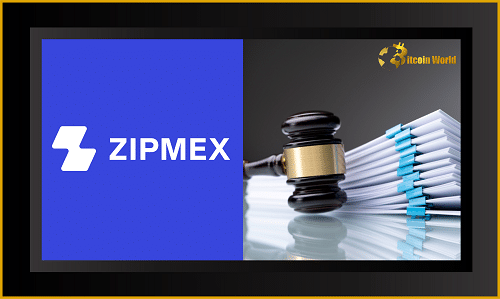Thailand’s crypto market is facing increased regulatory scrutiny as the Securities and Exchange Commission (SEC) of Thailand takes action against Zipmex, a prominent cryptocurrency exchange, and its Thai CEO, Akalarp Yimwilai. But what exactly is happening, and what does it mean for crypto traders and the future of digital assets in Thailand? Let’s dive into the details.
Why is the Thai SEC Accusing Zipmex and its CEO?
According to a statement released by the Thai SEC, the core issue revolves around Zipmex’s alleged failure to disclose crucial transactional information. The SEC specifically requested details concerning transfers and withdrawals of digital assets from the exchange. This request was made to ensure compliance with local regulations and protect investors within Thailand’s burgeoning crypto landscape.
The deadline set by the Thai SEC for providing this information was reportedly missed by Zipmex and Akalarp Yimwilai, leading to the current accusations of non-compliance. You can read the original statement from the Thai SEC here (in Thai).
Zipmex’s Response: Data Privacy Concerns?
Zipmex has responded to the Thai SEC’s accusations by stating they are in the process of gathering the requested documents. However, they’ve also highlighted a critical point: some of the information pertains to Zipmex Pte. Ltd., a separate entity based in Singapore, which they claim falls outside the direct regulatory jurisdiction of the Thai SEC.
In their official statement, available here, Zipmex emphasized the need for caution and careful consideration when disclosing information related to Zipmex Pte. Ltd. They cite the importance of adhering to regulations and upholding data privacy standards. This suggests a potential conflict between the Thai SEC’s request and Zipmex’s obligations to data privacy and potentially different regulatory frameworks in Singapore.
Here’s a key quote from Zipmex’s statement:
“With that said, any disclosure of Zipmex Pte. Ltd.’s information must be carried out with the utmost care and consideration to ensure that regulations are fully complied with and standards such as data privacy are duly observed,”
This situation raises questions about the extent of the Thai SEC’s regulatory reach and the complexities of cross-border operations for crypto exchanges.
Background: Zipmex’s Recent Challenges
This regulatory scrutiny comes on the heels of a turbulent period for Zipmex. Earlier in July, the exchange made headlines when it suspended withdrawals for its customers, citing “volatile market conditions” and financial difficulties faced by its partners. This move understandably caused concern and uncertainty among Zipmex users.
Reports later emerged indicating that Zipmex had exposure to Babel Finance, a crypto lending firm that also froze withdrawals in June. The estimated losses for Zipmex due to this exposure are reported to be around $100 million. This financial strain likely contributed to the withdrawal suspensions and has now brought further attention from regulatory bodies like the Thai SEC.
What Does This Mean for Crypto Traders in Thailand?
The Thai SEC’s actions against Zipmex and its CEO highlight a growing trend of increased regulatory oversight in the cryptocurrency space globally, and specifically in Thailand. For crypto traders in Thailand, this situation carries several implications:
- Increased Regulatory Scrutiny: Expect to see more stringent regulations and enforcement from the Thai SEC as they aim to protect investors and ensure market stability.
- Potential Delays and Uncertainty: The ongoing investigation and information requests could lead to further delays or limitations in services offered by Zipmex, at least in the short term.
- Importance of Due Diligence: This situation underscores the importance of users conducting thorough research and understanding the risks associated with different crypto exchanges, especially regarding their regulatory compliance and financial stability.
- Focus on Compliance: Crypto exchanges operating in Thailand will need to prioritize compliance with local regulations to avoid penalties and maintain operational legitimacy.
- Wider Market Impact: Regulatory actions against major exchanges can sometimes impact overall market sentiment and trading activity within the Thai crypto market.
Looking Ahead: The Future of Crypto Regulation in Thailand
The case between the Thai SEC and Zipmex is still developing. It serves as a crucial example of the evolving regulatory landscape for cryptocurrencies in Thailand and across the world. As digital assets become more mainstream, governments and regulatory bodies are grappling with how to best oversee this nascent industry while fostering innovation and protecting consumers.
The outcome of this situation will likely set precedents for how crypto exchanges operate in Thailand and could influence future regulatory approaches. Crypto traders and investors in Thailand should closely monitor these developments and stay informed about the evolving regulatory environment.
Key Takeaways:
- The Thai SEC is accusing Zipmex Thailand and its CEO of non-compliance for failing to disclose transactional information.
- Zipmex cites data privacy concerns and the involvement of a separate Singapore-based entity (Zipmex Pte. Ltd.) in its response.
- This regulatory action follows Zipmex’s recent withdrawal suspensions and reported losses due to exposure to Babel Finance.
- Crypto traders in Thailand should be aware of increasing regulatory scrutiny and exercise caution when choosing exchanges.
- The situation highlights the ongoing development of crypto regulations in Thailand and globally.
Stay tuned for further updates as this story unfolds. The relationship between crypto exchanges and regulatory bodies in Thailand is certainly one to watch.
Disclaimer: The information provided is not trading advice, Bitcoinworld.co.in holds no liability for any investments made based on the information provided on this page. We strongly recommend independent research and/or consultation with a qualified professional before making any investment decisions.


